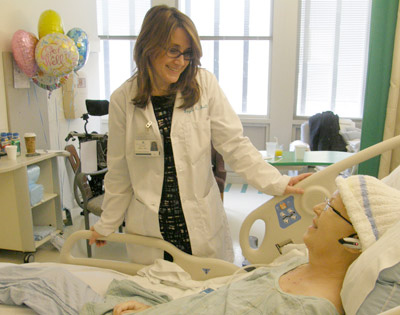In the Final Days
by Samuel T. Clover ’91
In an era of skyrocketing medical costs and a changing health care system, here is a critical question: How do we care for patients who have only months to live? Do we make them as comfortable as possible while we wait for them to die, or do we help them regain basic living skills through rehabilitative care in spite of the prognosis?
 For Dr. Gayle R. Spill Ephraim ’86, a rehabilitation specialist at the Rehabilitation Institute of Chicago (RIC) who works with terminal cancer patients, the answer is simple.
For Dr. Gayle R. Spill Ephraim ’86, a rehabilitation specialist at the Rehabilitation Institute of Chicago (RIC) who works with terminal cancer patients, the answer is simple.
“Even if a patient has cancer, and they’re dying; they’re not dead yet,” Spill says. “Caregivers and physicians can’t just write people off because we can’t cure their disease. We have to do everything we can to help them live their life to the fullest for whatever time they have left.” She notes that studies of cancer patients show that the urge to maintain independence is very strong, sometimes even stronger than the desire to live.
Spill, who works with patients at Northwestern Medical School’s Lurie Cancer Center, recently co-authored a study examining how rehab doctors, or physiatrists, and oncologists think differently about prescribing rehabilitation treatment for advanced cancer patients. The study grew out of a clinical medical ethics fellowship she completed at the University of Chicago in 2005.
Some of the results are startling. In one question, Spill asked at what prognosis they would not recommend a rehabilitation program.
“Rehab doctors said prognosis doesn’t really matter,” says Spill. “What matters is can they improve functionally? Oncologists were much more likely to say if their prognosis is three months, two months, or one month or less, then I wouldn’t bother with rehab. So, here are all these patients that could be referred to rehab to try to make some functional gains—even if they’re minimal—that aren’t being referred because the oncologist doesn’t think it’s worth it.”
Spill completed the study with an oncologist. The overall conclusion is that oncologists and physiatrists have very different attitudes and practices about what is necessary and prudent.
Spill traces her interest in medical ethics to a bioethics class she took at Lafayette. Though she intended to become an engineer, she decided to go to medical school “on a whim.” She enrolled at the University of Medicine and Dentistry of New Jersey-Robert Wood Johnson Medical School, and later completed a residency at RIC.
While going through medical school, Spill searched for the specialty that would fit her interests. She found rehabilitation medicine to be intriguing. “Instead of trying to cure people, you’re really just trying to help them live a better life,” she says, “and I thought that was just the right thing.”